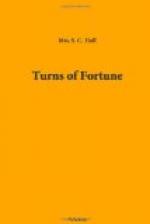“Hush, Mabel!” exclaimed her aunt; “how can you say anything so harsh of him from whom we inherit all we have. He was careful, peculiar, very peculiar; but he saved all for me; and may God judge mercifully between him and me if I cannot in all things do as he would have had me,” and then she paused, as if reasoning and arguing with herself; apologising for the human throes in her own bosom that led her to act so frequently in direct opposition to her father’s desires; so that to those who could not understand her motives and feelings, she appeared every day more inconsistent. “It is difficult to judge of motives in any case. I am sure, if he had only gone abroad into the world, and seen distress as I have seen it, he could not have shut his heart against his fellow-creatures: but his feelings were hardened against some, whom he considered types of all, and he shut himself up; and seeing no misery, at last believed, as many do, whom the world never dreams of calling as you called him, Mabel—seeing no misery, believed that it only existed in the popular whine. I am sure, if he had seen, he would have relieved it. I always think that when I am giving; it is a great blessing to be able to give; and I would give more, were I not fearful that it might injure you.”
“Injure me, dear aunt, how?”
“Why, Mabel, my heart is greatly fixed upon seeing you a rich heiress, and, in time, suitably established.”
“You have just been saying how much happier you were when you were all poor together, and yet you want to make me rich.”
“People may be very happy in poverty before they have known riches; but having once been rich, it would, I think, be absurd to suppose we could ever be happy again in poverty.”
“I saw,” replied the girl, “two children pass the gate this morning while I was gathering flowers—bunches of the simple white jessamine you love so much, dear aunt—and they asked so hard for bread, that I sent them a shilling.”
“Too much,” interrupted Sarah Bond, habitually rather than from feeling; “too much, dear Mabel, to give to common beggars.”
“There were two, you know, and they looked wan and hungry. About three hours after, I was cantering my pony down Swanbrook Lane—the grass there is so soft and green, that you cannot hear his feet, while I can hear every grasshopper that chirps—suddenly, I heard a child’s voice singing a tune full of mirth, and I went softly, softly on; and there, under a tree, sat one of my morning acquaintances, making believe to sing through a stick, while the other danced with bare feet, and her very rags fluttered in time to the tune. They looked pale and hungry, though a thick crust of bread upon the grass proved that they were not the latter; but I never saw more joy in well-fed, well-clothed children, for they paused and laughed, and then began again. Poverty was no pain to them, at all events.”
“My dear,” said Sarah Bond, “you forget the crust of bread was their riches, for it was a superfluity.”




